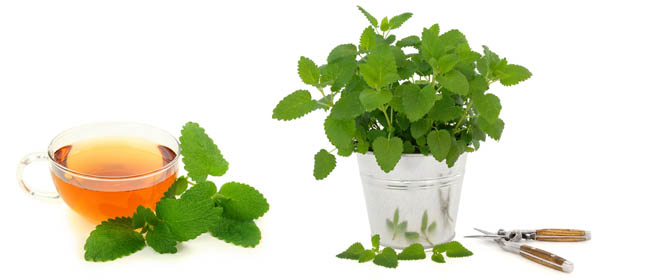
Long revered for its medicinal properties, lemon balm (Melissa officinalis) has a great reputation for reducing stress, elevating moods, promoting sleep, and easing digestive distress, including gas and bloating. It’s also antibacterial, antifungal and antiviral, so lemon balm tea is a superb drink if you’re feeling under weather.
Lemon balm can also be used in the kitchen to flavour drinks, fruit salads and chicken and fish dishes. However you should avoid cooking it for any length of time as the essential oils evaporate and leave a bitter taste. Add at the end of cooking.
Or use the leaves as a handy mosquito repellent. Simply crush a handful in your fingers then rub onto your skin. Mozzies will be sent packing.
IN THE MEDICINE CABINET
- Lemon balm has mild sedative and mood enhancing properties and is commonly used to treat insomnia, anxiety and depression. It also helps reduce fever, ease nausea and relieve gas.
- To make an infusion, loosely pack a teapot with fresh leaves, add boiled water and steep for 10-15 minutes. Drink up to 3 cups per day. Or use 1 teaspoon of dried herb per cup of boiled water. Steep as for fresh.
- Fresh leaves can be thrown into baths to act as a gentle herbal sedative.
- The antiviral properties of lemon balm are typically used in topical creams or ointments for cold sores, promoting faster healing.
- To make your own cold sore treatment, infuse 1.5 tablespoons of fresh or 3 teaspoons of dried lemon balm leaves in one cup of water for 10 minutes. Strain and dab onto spots 3-5 times daily.
- Consult your doctor before taking lemon balm if pregnant, breastfeeding or on medication.
IN THE GARDEN
- Lemon balm is a hardy perennial that grows 60-80cm high. In winter the tall stems die down and the plant remains a low basal clump until spring.
- Plants are easy to grow from seed or cuttings. Sow seeds in trays in early spring, or take stem cuttings from vigorous growth in late spring/early summer.
- Plant in free-draining but moist soil in sun or semi-shade. In the heat of summer, provide some shade during the hottest part of the day, or plants may wilt.
- Cut back after flowering to prevent self-seeding. Lemon balm has a habit of spreading and can become invasive if you let it go.
- Harvest leaves for drying just before the flowers open. Be careful not to bruise the leaves when harvesting, as quality will be reduced. Hang in bunches in a well-ventilated area out of direct sunlight. Once dry, strip the leaves and store in an airtight container.
Jane Wrigglesworth
Jane Wrigglesworth edits Herb News, the journal of the Herb Federation of New Zealand Inc, and writes a herb column for NZ Gardener magazine.
 My Favourites
My Favourites










Speak Your Mind